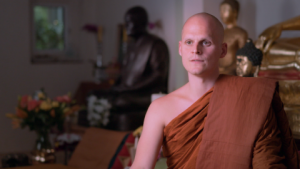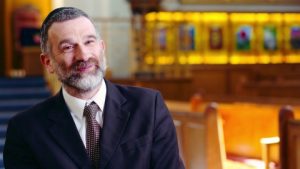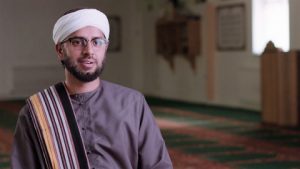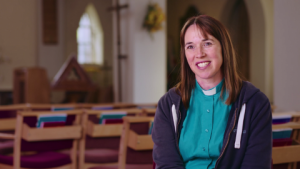Meet Brother Matthew, he is a Carmelite Friar. Check out the daily routine of his life as friar. We’ll see his commitment to a life of prayer, contemplation, and service. Carmelite friar’s spend their time doing early morning prayers, time spent in quiet reflection, communal meals, and work dedicated to both spiritual and practical tasks. The friars balance their contemplative practices with efforts to help the community, embodying their deep devotion to their faith and spiritual discipline.
Transcript
Brother Matthew: Hello, I'm brother Matthew, I'm a Carmelite friar here in the UK, and that means I live in a community with other friars. So a friar is a man who is drawn to serve God and to live according to a certain set of rules in the Roman Catholic Church. A priory is just a word we use to describe the place where friars live. So the word friar comes from the Latin word frater, which means brother. And I think overall that describes perfectly how we relate to one another in the community. Monks and friars are quite different. Monks live in monasteries and generally you'll find monasteries out in the countryside a long way away from towns and cities, whereas friars, you'll find our prior is in the middle of towns, in the middle of cities. And for us that's really important, not only because we rely on the generosity of others, but because of our ministry we really see ourselves as ministering in the midst of the people, sharing our experiences of God, but also being there so people can share their experiences with us.
So different priors do have different timetables, but here in Aylesford I get up at 6:30 usually. So normally when I wake up I just go and have a shower straightaway, and once I'm dressed, I'll go down to our community kitchen and make a cup of tea. I'll usually then come back up to my room with my cup of tea and do my first prayers of the day, which we call the Office of Readings. And really, we can do it at any time. But I like to do it first thing because it really sets me up for the day.
As a Carmelite, we wear this habit and it helps us to be identified as Carmelite. So the Carmelite habit is made up of a brown tunic, a brown scapular which is like the apron at the front and the back, the hood, which we call the capuche. And then it's tied together at the waist with a leather belt. On special occasions or big events, will also wear a white cloak over the top. And here in the UK, the Carmelites have also got another name which is the White Friars, and that comes from that white cloak. I think for me, as I put the habit on, it reminds me that I am doing something different and that I am called to do something different. On those occasions where I do walk down the street to get some funny looks, but then you realise sometimes you forget why, and then you look down and realise that you're not wearing the latest trend. So we wouldn't wear our habit all the time, but we would usually wear it when we are together and praying. So morning prayer, evening prayer, mass. And I think it's one of those great symbols of something that unites us as brothers together, but also in our ministry and serving in the church together. Morning prayer here at Aylesford is at at 8 a.m., and it's the first opportunity we have together as a community to gather in the chapel and the chapel is just another word, another place of worship. Is it usually a little bit smaller than the church. And morning prayer here at Aylesford is open to everybody, not just the friars.
Friars: Oh God come to our aid. Oh Lord make haste to help us.
Brother Matthew: And it consists of a hymn, some psalms, a short reading from Scripture, and then some intercessions, some prayers. Now, as brothers, we all have different ministries, and some are called to serve as priests, and some are called to serve in different ways. But really what's most important for us is that we are brothers. We are all that family together. So all friars are men and we live in communities of men. That integral part of being a friar. I suppose the female equivalent of a friar is a sister or a nun.
Brother Matthew: And the Carmelite Order takes its name from Mount Carmel in the northwest of the Holy Land. It's a mountain and around the 13th century. So in the 1200s, a group of men, we think maybe pilgrims or crusaders returning home, settled on Mount Carmel to live a life of prayer. And they settled near a place called the Well of Elijah. And they really took the spirit of Elijah as their role model. So Elijah was a prophet in the Old Testament, and he spent a lot of time in silence alone with God, discovering that relationship with God, but also going out and ministering and being a prophet to the people as well, taking what he learned from that silence to the people.
So morning prayer is usually half an hour. So around 8:30 we'll leave the chapel and go to our ministries, go to our work. It could be meeting those that have come to visit us, celebrating mass, giving retreats or just meeting people. But overall, they're just ways in which we serve the community and we serve the church and we serve God. I'm studying at the moment, so my work would generally be reading for essays, writing essays, or I might have a class that day.
All friars take vows, and vows are promises that we make to God. I haven't made the vow of silence, but as a Carmelite friar, I've made a vow of poverty, chastity, and obedience. The vow of poverty means that I don't own anything. Before I joined, I had a car. I had a job. I was earning money. I had a laptop and things. When I joined and made my vow of poverty, I gave up those things. It doesn't mean I threw them away. It just means that what I now have, I share with my brothers. Overall, I think it's just been really conscious of not using the word mine. I've made the vow of chastity, which means I will always be single. I'll never have a partner. I'll never get married. Now, the vow of chastity doesn't mean that I can't love. But it means that I'm called to love everybody equally. The vow of obedience is a promise to do as I'm told to do as I'm asked by the brother who's been chosen in my community to be in charge, obedient to the brother who is in charge of all the friars in the country, and obedient to the friar, the brother who has been chosen to represent us in the world. I also vow to be obedient to the church and most importantly, to be obedient to the will of God. It's living a life that allows me to be really fulfilled, trusting that those who have responsibility over me have my best interests at heart. The vows don't just come from anywhere. We find them in the Bible, and we find them specifically in the life of Jesus. And so we try to imitate that life in really concrete ways.
So at midday, we gather together for mass, and mass is a celebration of who we are as Catholics, gathering together to celebrate this great gift that we have, where God becomes present to us in the bread and wine. Jesus says in the Bible, this is my body, this is my blood. And the mass we really celebrate those words as God becomes truly present to us. Another word for Mass is Eucharist, and Eucharist is a word that just means thanksgiving. And it's a time for us to give thanks to God in the way that Jesus showed us during his life. And here at Aylesford, when we have school groups or visitors, mass is open to everybody. Everybody is welcome to that community to remember that God is at the centre. And after mass is always a great opportunity then to chat to those people that have joined us as we go back out into our world.
At 1:00, we join together in our big dining room and we have a meal together. We have lunch together. Most of our meals are quite simple. That vow of poverty again, of not having always what we want, but just what we need. Living by our means. Living simply. After lunch we go into midday prayer. But it's not really a midday it's at 2:00 after midday prayers, which are about 15 minutes. We would return to our work and our ministries, so around 2:30 there's usually one brother on duty, so they would hear confessions of people visiting or give tours around the grounds of groups, give talks, reflections.
The process to become a friar is a long one. It takes around 5 to 7 years and we call that period initial formation. There are set stages of formation, but overall it's a constant process of speaking to others, listening to others, praying and trying to work out what God is asking of us and we call this discernment. It begins with what we would call a pre-novitiate. So that someone who is going to be a novice and it's a time of openness, discernment, where someone will come and live alongside the community and live in the style of a friar. After that period of time, they may ask to become a novice, to move into what we call the novitiate. And it's not just that person asking the community, but also the community deciding amongst themselves is this person a good fit? The novitiate then is a really intense year of prayer, where we live the life of a Carmelite friar, learning more about the tradition and the history, but also our role within the church and building that relationship with God. At the end of the novitiate, the year of being a novice. And if you still feel called to live this way of life, you would ask the community if you could take these vows of poverty, chastity, and obedience. We call this Simple Profession, and that's the stage of formation that I'm in right now. Most friars like myself will go through a course of philosophy and theology, and it's so we're really equipped to answer those questions that people will ask us. At 6:30, the community will gather again for evening prayer.
Evening prayer will be around 15 minutes, but we go up to 7:00 and spend an extra 15 minutes in silence together. It's not the same as sitting in silence on your own. There's something really different about sitting in silence with other people. We work together. We laugh together. We talk together. But also we listen together and we pray together. After that silent time, we go up to the community kitchen and we will have supper together. Some will make sandwiches or eat the leftovers from lunch. After that, we're sort of free. Then we might watch TV in the TV room or sometimes we'll just sit around the kitchen table and chat. Living in a religious community is just like living in a family. You have those moments together, but moments on your own. But you know that in whatever you're doing, you are supported. It's not always easy, though, and they say that you can choose your friends, but you can't choose your family. And sometimes community life is a bit like that. I think it's the way of life that allows me to be exactly who I am. This is a way of life that isn't very fast, and it doesn't ask us to go after the next big thing, but it's just been able to stop and think just one thing. Yes, this is good and I'm happy. I wonder how many people can say that about their lives and about their work, but also it's just the freedom to be completely comfortable with who I am.










